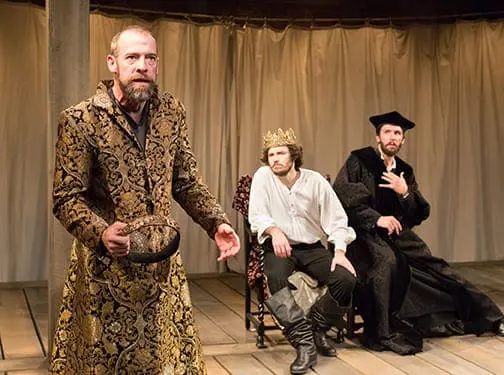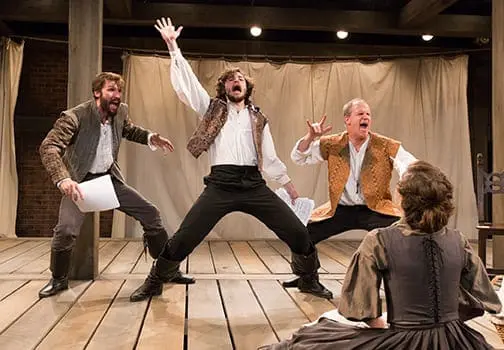The Tension Between
By Dramaturg Jessica Bedford
In an interview with New York magazine, playwright Bill Cain discussed his favorite example of equivocation. It comes from Miep Gies who told the Nazis, treat “We are hiding no one.” On the surface, this a bold face lie. They were in fact hiding eight Jews, including Anne Frank and her family. But on another level, it is profoundly true: they weren’t hiding anyone, what they were actually doing was saving their lives. In his play, Equivocation, Cain presents us with a character, an early prototype of Macbeth, who tells us, “We live between two fires: above – the Sun – /God’s all-seeing Eye – and yet beneath our feet /Another fire burns.” Heaven and Hell. And we live in the tension between – in the grey area, the place where, often, two things are true. Miep Gies was lying and Miep Gies was telling the greatest truth of her life.
I teach Theatre History. When I have a student who is stumped on the order of things, my favorite thing to tell him or her is to look at the themes of the plays. History reveals itself in the themes. Equivocation takes us back to early 1606. King James I of England has a commission for his playwright, William Shagspeare. (This is a historically acceptable spelling of Shakespeare’s name. We’re dealing with a time that’s before the codification of spelling and a largely illiterate society which put more weight in what they heard. In fact, in the extant signatures we have belonging to Shakespeare, he spells his name differently in each one. But I digress…) The commission? Write a play about the Gunpowder Plot, the failed terrorist attempt by thirteen young Catholic men to blow up the Protestant Parliament and Protestant King with it; a play which will live in posterity and become the official version of the events. An official version of the events… You will likely gather from the need for such a version that the “events” are very much in question. There seem to be two realities and Shagspeare, or Shag, is living in the tension between. Despite the historical setting, Equivocation is a very recent play. If I take my own advice and look to the themes, it’s easy to draw parallels: terrorism plots, official versions of events (WMD’s? What WMD’s?), etc. But I think Cain is exploring something more complicated and delicate than just a political message: how divisively black and white contemporary American society has become in its thinking and how dangerous it is to deny that humans really exist in the grey, in the tension between black and white. And Cain recruits Shagspeare into his plot. Instead of a straightforward, propagandistic retelling of the Gunpowder story, casting Guy Fawkes and Garnet as evil terrorists and the foiling of their attempt a victory for the powers of good, what does Shag write for his king? Macbeth: the story of a man ambitious above his station, complicit in regicide and its tragic and horrific consequences both for the country and the murderers. I leave it to you to look for the equivocation in that choice.

Ian Merrill Peakes as Richard Burbage playing Macbeth as Sean Lally and Dan Hodge look on. Photo by Mark Garvin.
Equivocation is a play written about the writing of a play, set in a theatre (Shag’s Globe) which you will see in a theatre (the Arden’s Arcadia Stage). It’s more than a little bit what the scholars would call “meta.” But with this production, the layers don’t end there. Ian Merrill Peakes, who played Macbeth at the Arden last season, will play Richard Burbage, a member of Shag’s company, who was the original Macbeth. Richard Burbage was the son of actor and theatre manager James Burbage. Ian Merrill Peakes is the son of actor and former artistic director John Peakes. James Burbage owned and ran The Theatre, the first permanent English theatre, so Richard grew up in a theatre. John Peakes founded and ran the BoarsHead Theatre, a prominent regional theatre in Lansing, Michigan, so Ian grew up in a theatre. Kind of amazing, right? Joining Ian as the remaining players in the King’s Men are Tony Lawton, Dan Hodge, and Sean Lally; some of Philly’s favorite sons doing virtuosic turns in multiple roles. Longtime Arden favorite Eric Hissom rounds out the company as Shag himself and Arden newcomer Campbell O’Hare joins as Judith, Shag’s daughter.
Equivocation is a rich many-layered piece of theatre, and it places tremendous faith in the passion and intelligence of its artists and its audience. It requires both artists and audience to sit forward rather than back, to engage and to think. Terry Nolen, the designers and actors of this production have endeavored to lift the play’s language, bringing it electrically to life, and to bring the audience face to face with its own assumptions about truth. I hope you enjoyed the show.

